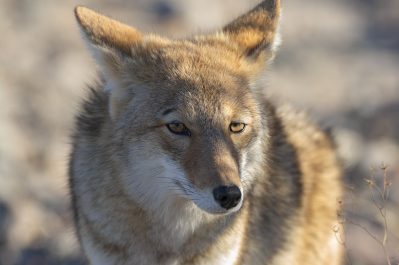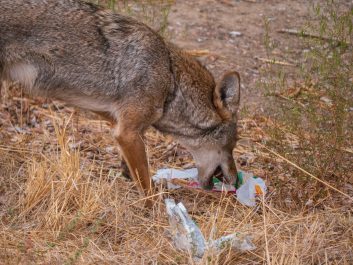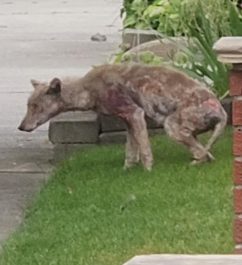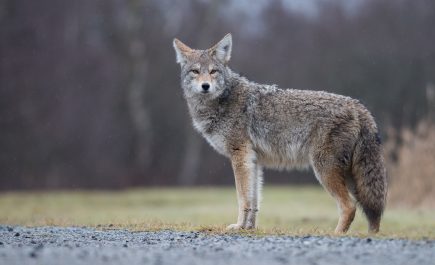You are what you eat: A tale of trash, trouble and coyotes
Coyote reliance on human food is leading to bolder behaviour, increased illness, disease and death.
Environment | December 10, 2024
Food wrappers and scraps, plastic bottle caps, coffee cups, and garbage – while this may not sound appetizing, many of these items have been consumed by coyotes as food. Most urban coyotes have highly adaptable diets, however, their reliance on human food and discarded items is becoming more common, which can lead to bold behaviours in a few ways.
Coyotes may lose their natural fear of people and venture into urban areas in search of food. This increases the risk of encounters with humans and pets.
While coyotes are strong predators, hunting for prey can be challenging, leading some urban coyotes to adapt to new food sources that require little hunting and effort to satisfy their hunger. Instead of hunting small mammals or foraging for nuts and fruits, some coyotes have developed a taste for human food, particularly highly processed food like fast food, junk food and sweets. Many urban coyotes can’t distinguish between food and what is not food – like bottle caps, pop can tabs, food wrappers and containers or plastic bags. This shift in eating habits has significantly altered their diet and caused more harm than good.
Coyotes play an important role in controlling the population of rapidly reproducing mammals like mice, rabbits and rats. While they are natural predators, they are also scavengers.
Over the last few decades, coyotes have had to adapt as cities have expanded into natural habitats. Nowadays, urban coyotes consume twice the amount of human food compared coyotes living in rural areas, who still hunt for food. So why have some coyotes stopped hunting for their food? It all comes down to what is most easily available. Discarded human food is easier to find than stalking prey, making humans a more convenient option to approach for food or wandering around a parking lot where food scraps are easy to come by.
Why human food is bad for coyotes
A diet rich in human food is unhealthy for coyotes – and can have several negative consequences. They are now facing threats like malnutrition, illness, disease, parasites and weakened immune systems. When coyotes stop hunting prey, which is high in protein, their gut bacteria can start to change. They can no longer digest, absorb, or break down nutrients – which can often lead to digestive issues and damage the small intestine, where most nutrients and minerals absorption happens.
A high-carb diet can negatively impact coyotes’ immune system and nutrition, making them more susceptible to parasites and other illnesses. Some coyotes are eating high amounts of sugary, high-carb foods like doughnuts, bread, pasta, candy, rice and crackers that are effecting their health. Coyotes that eat human food may be more likely to act out, become sick, or die. Their search for easy meals results in more frequent and potentially dangerous encounters with humans.
Studies have been done on coyote eating habits, and junk food could be leading to bolder behaviours and more frequent and potentially dangerous interactions with humans.
Ways to encourage coyotes to maintain their natural diet
By making our neighbourhoods less appealing to coyotes, we can encourage them to remain in natural urban areas and encourage them to return to their carnivore diets. To do this, residents need to remember to:
- Secure garbage and compost bins to prevent easy access
- Remove all potential food sources from your property
- Don’t feed coyotes
- Don’t litter food items, wrappers and containers
- Wash food items thoroughly before putting them out for recycling
- Keep pet food and water bowls indoors
- Remove ripe fruit from trees and fallen fruit from the ground on your property
- Avoid leaving large amounts of birdseed on lawns
Coyotes are usually timid and avoid humans; however, they become more comfortable around people the more they are fed, which can lead to a bigger chance of encounters and interactions with them. As more urban coyotes rely on scavenging than hunting, many need to teach their pups how to hunt for prey rather than how to find human food. By cutting off access to human food sources and maintaining a respectful distance, we can easily encourage coyotes to go back to hunting in their natural habitats and eating a carnivore-style diet high in protein.
As we continue to share our city with wildlife, understanding and addressing how our actions can change, or influence coyote behaviour is important. By making small changes to our own habits, we can ensure we can safely coexist with coyotes.
Tags
Media contact
City of Mississauga Media Relations
media@mississauga.ca
905-615-3200, ext. 5232
TTY: 905-896-5151







